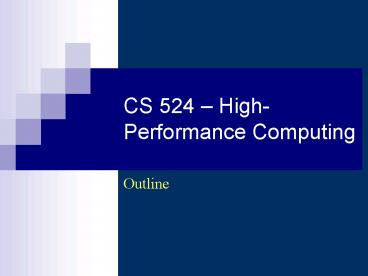CS 524 PowerPoint PPT Presentation
1 / 14
Title: CS 524
1
CS 524 High-Performance Computing
- Outline
2
Description (1)
- Introduction to high-performance computing
architectures and programming environments - Performance enhancements for single-processor
computers - Data locality, cache optimizations, data
dependences, loop optimizations - Parallel computer architectures
- Parallel computing performance metrics
- Message-passing programming using MPI
- Shared-memory programming using OpenMP and
P-threads - Dense matrix algorithms
- Sparse linear system algorithms
3
Description (2)
- Emphasis on code optimizations and programming
issues - This is not a hardware design course
- Programming in C/C only
- Programming under Unix/Linux environment
4
Goals
- Mastery of fundamental performance issues for
parallel and serial computing - Familiarity with shared-memory and message
passing architectures and models for parallel
program development - Hands-on experience in designing and implementing
efficient algorithms for high-performance
computers - Familiarity with the current state-of-art in
parallel programming environments, portable
software libraries, and program development
5
Before Taking This Course
- You should be comfortable with
- Data structures and algorithms
- CS213 is a prerequisite
- You should be comfortable with (matrix) algorithm
descriptions and implementations in a high-level
programming language - Computer organization
- CS223 is a prerequisite
- CS423 is NOT a prerequisite
- Programming in C/C
- Majority of work under Unix/Linux environment
- Linear algebra
- Matrix operations, systems of linear equations
6
After Taking this Course
- You should be able to
- understand the basic architectures of single- and
multi-processor computers - develop and implement programs for
distributed-memory and shared-memory parallel
computers - evaluate and enhance performance on single- and
multi-processor computers - develop programs in MPI and OpenMP
7
Grading
- Points distribution
- Assignments ( 5) 35
- Quizzes ( 5) 10
- Midterm exam 25
- Final exam (comprehensive) 30
8
Policies (1)
- Quizzes
- Quizzes may be announced 1 to 2 days in advance
or they may be unannounced - Sharing
- No copying is allowed for assignments.
Discussions are encouraged however, you must
submit your own work - Violators can face mark reduction and/or reported
to Disciplinary Committee for action - Plagiarism
- Do NOT pass someone elses work as yours! Write
in your words and cite the reference. This
applies to code as well. - Violators can face mark reduction and/or reported
to Disciplinary Committee for action
9
Policies (2)
- Submission policy
- Submissions are due at the day and time specified
- Late penalties 1 day 10 2 day late 20
not accepted after 2 days - An extension will be granted only if there is a
need and when requested several days in advance.
10
Summarized Course Contents
- Introduction to single- and multi-processor
computing models and architectures - Cache tuning and characterization
- Data locality, data dependences, loop
optimization - Parallel computer performance metrics,
interconnection networks - Message-passage programming in MPI
- Shared-memory programming in OpenMP and P-Threads
- Parallel dense and sparse matrix algorithms
11
Course Material
- Texts
- Introduction to Parallel Computing Design and
Analysis of Algorithms, V. Kumar, A. Grama, A.
Gupta, G. Karypis, Benjamin/Cummins Publishing
Co., 1994. - Using MPI Portable Parallel Programming with
the Message-Passing Interface, 2nd Ed., W. Gropp,
E. Lusk, A. Skjellum, MIT Press, 1999. - Parallel Programming in OpenMP, R. Chandra et
al., Academic Press, 2001. - Techniques for Optimizing Applications High
Performance Computing, R.P. Garg and I. Sharapov,
Sun Microsystems Press, 2002. - Introduction to Parallel Processing, M.
Sasikumar, D. Shikhare, P.R. Prakash,
Prentice-Hall of India, 2000.
12
Course Web Site
- For announcements, lecture slides, handouts,
assignments, quiz solutions, web resources - http//suraj.lums.edu.pk/cs524w03/
- The resource page has links to information
available on the Web. It is basically a meta-list
for finding further information.
13
Other Stuff
- How to contact me?
- Office hours 2.30 to 4.00 PM TR (office 132)
- E-mail akarim_at_lums.edu.pk
- Stop by my office
- By appointment
- Philosophy
- Knowledge cannot be taught it is learned.
- Be excited. That is the best way to learn. I
cannot teach everything in class. Develop an
inquisitive mind, ask questions, and go beyond
what is required. - I dont believe in strict grading. But there has
to be a way of rewarding performance.
14
Reference Books in LUMS Library
- High Performance Cluster Computing Programming
and Applications, Volume 2, Rajkumar Buyya
(Editor), 1999. - Parallel Programming Techniques and Applications
Using Networked Workstations and Parallel
Computers, B. Wilkinson and M. Allen, 1999,
5.3W686P. - Parallel Computer Architecture A
Hardware/Software Approach, D.E. Culler et al.,
1999. - Computer Organization, Hamacher et al., 2002.
- Computer Organization and Architectural Design
for Performance, W. Stalling, 2000. - Using MPI-2 Advanced Features of the Message
Passing Interface, Gropp et al., 1999. - How to Build a Beowulf, T.L. Sterling et al.,
1999. - Beowulf Cluster Computing With Linux/Windows,
T.L. Sterling (ed.), 2002, 5.43 B481. - Parallel I/O for High Performance Computing, J.M.
May, 2001.

